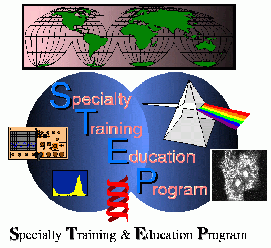


[Introduction to STEP]
[Specialty Areas]
[STEP Committee Members]
[Search for Keyword]
Cell Cycle Analysis
Cancer Research Institute (CRI) New York Medical College 100 Grasslands Road Elmsford, New York, 10523Laboratory Profile
Institute Head: Dr. Zbigniew Darzynkiewicz
STEP Director: Dr. Frank Traganos
1. Facilities: Approximately 2,000 sq. foot, three laboratories containing sample preparation and instrument lab, tissue culture facility, molecular biology lab for preparation of gels, and biophysics laboratory.
2. Instrumentation:
Flow cytometry: Ortho Systems Cytofluorograf II with dual air cooled lasers, ICP 22 flow cytometer (mercury arc lamp based), FACScan flow cytometer, and CompuCyte static microscope-based laser scanning cytometer.
Other major items: Zeiss spectrophotometer, Omega titration microcalorimeter, Bio-Rad pulse-field and slab gel electrophoresis apparatus, Nikon Microphot FXA fluorescence microscope with differential interference optics and automatic 35 mm and 4 x 6 cameras; Millipore Cytofluor 2300 automated fluorescence detection system.
Computer and analysis programs: All flow cytometry data analysis systems are IBM PC-based except for Hewlett Packard LYSYS software on the FACSscan flow cytometer. Phoenix Flow Systems Software Acqcyte for acquiring data and Mplus, Multicycle, Multi 2D for data analysis. Software is available for converting HP files to IBM-based files for analysis on Phoenix system programs. Each flow cytometer is connected to its own dedicated computer and laser printer. Other software include SigmaPlot, CorelDraw, and various spreadsheet programs. An HP Scanjet IIc is also available with OCR software for scanning graphics into word processing software (WordPerfect).
3. Specialization Areas: The research is focused on apoptosis, cell cycle, and mechanism of action of antitumor drugs. New cytochemical and molecular methods applicable to flow cytometry or static cytometry (CompuCyte) are being developed to assist in this research (See also under Drug Effects on Cell Cycle and Apoptosis).
4. Special Opportunities: The procedures listed below are routinely used in the laboratory. Many of these techniques were developed in this laboratory. The trainees are expected to learn the methods of their choice from the following ones:
5. Special Courses Offered: Cell cycle analysis involving detection of cyclins D, cyclin E, cyclin A, and cyclin B: Unscheduled expression of these cyclins in tumor cells. (See also under Apoptosis and Drug Effects on the Cell Cycle).
6. Graduate Program: None currently available.
7. Local Accomodation: Ramada Inn (200 yds to lab) has a daily rate of $65. Arrangements can be made through the Cancer Research Institute or directly: (914) 592-3300; Eileen O'Donahue (mention N.Y. College for the above discount rate).
8. Transportation: Airports: White Plains, La Guardia or Kennedy. Buses (Carey) to Grand Central Station ($11.) where one takes Metro North Upper Harlem Line ($10.) to Valhalla or North White Plains. You will be picked up at the station. Taxi from White Plains airport approximately $35.
9. Cost of Internship: A base rate of $150. per day, negotiable for students from disadvantaged countries. Duration of internship, or participation in the course: by arrangement.
10. Communication:
Drs. Frank Traganos or Zbigniew Darzynkiewicz Cancer Research Institute New York Medical College 100 Grasslands Road Elmsford, N.Y. 10523 Phone: (914) 347-2801 FAX: (914) 347-2804 E-mail: darzynk@nymc.edu
